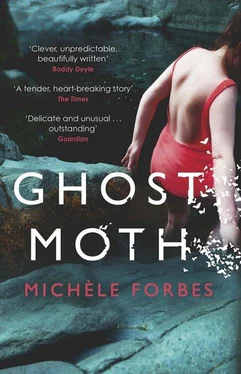She stood in the tailors’ room, where Tom had worked, lit only by the streetlamp, which cast its light into the room from outside. Everything in its rightful place, everything undisturbed. Stacked on the far table were the rolls of new cloth; above them on the shelf were boxes of tiny glass beads and cloth buttons. There on the worktable lay his measuring tape in its little tan leather case. She took off her coat and placed it over his chair.
She noticed his black notebook under his desk lamp. It was the notebook from which he had made tiny bombs of floating fire on the night of their river walk together. She reached out and lifted it, then opened it. Inside were notes on tailoring, on materials ordered, on buttons and threads recently stocked, on the cost of suits. She could see where Tom had torn pages from its seams. Farther on there were names and addresses of clients. “Two-piece suit in striped wool: Mr. Napier”; “3 x button-down soft-collar shirts: Mr. Harris.” Katherine turned the pages, scanning their contents quickly. Near the back of the notebook and written in large soft letters was her name, together with the measurements of her chest, her hips, her waist, and her neck. Beside her name was written Carmen and the date of the opening night. But it was the writing at the bottom of the page that jangled her very bones. Written in pencil, in tiny letters, were six lines of a poem:
“— yet still stedfast, still unchangeable,
Pillow’d upon my fair love’s ripening breast,
To feel for ever its soft fall and swell,
Awake for ever in a sweet unrest,
Still, still to hear her tender-taken breath,
And so live ever — or else swoon to death. ”
And underneath the poem were the words “I have fallen head over heels in love — isn’t that what they say — head over heels, as though I have tumbled, fallen into a dream. Which I have. I can hardly describe the feeling she gives me. Everything in my life feels new again. Everything has lifted from the shadows. I have never felt this way about anyone before. K. is my salvation. I need her so much that my heart hurts.”
And there, sitting on top of the cabinet, was the statuette. Katherine lifted it and held it carefully in her hands. She sat down on a bundle of white cotton that had been left on the seat of his chair. She felt that everything in the room was waiting. Waiting for him to come back. Perhaps if she sat quietly and still enough, she could draw him back to her. Perhaps all she had to do was wait, wait like every other object in the room was waiting. Wait until the morning was a net of silver threads that would pull him in. Pull him back to her. How could he be just not there anymore? The incoherence of it all. Wait, wait, he will come, he will come! She sat awhile longer.
Time tired of itself.
Maybe she could come back tomorrow and the night after and the night after that. As long as it took.
She knew how foolish she was being, for why would he come back after she had banished him?
She looked at the statuette in her hand. She would wrap it up in cloth to protect it and she would put it in her bag and take it home. She pulled a piece of white cotton from the seat beneath her. She looked at the cloth. It was spotted with her menstrual blood from where she had been sitting.
K ATHERINE STANDS AT THE KITCHEN SINK. She pushes the white cotton sheets, which had been used for Madam Maureen’s tent, under the warm, sudsy water. Pockets of sheet puff up indiscriminately here and there under the force of her hand, like water lilies blooming. While the day is warm and dry, she would do well to get the sheets and blankets washed, dried, and aired.
A flat tiredness governs her every move now. It is a plain, numbing tiredness, like the tiredness that follows shock. Perhaps tonight, she thinks to herself. Perhaps tonight I will sleep more soundly and feel better for it.
She leaves the sheets to soak and, drying her hands, moves to the box radio, which sits on the floor in the corner of the back room underneath the television set. Turning the dial at the front, she watches the tiny yellow lights appear on its copper grid and a voice fades in.
“. . has today speculated on the deployment of British troops into the city of Belfast after last night’s violence, acting on the request made by the commissioner of police, Harold Wolseley. Mr. Callaghan has said that. .”
She goes to the back door to check on Stephen. Elizabeth and Stephen are gathering stones together in the yard. The few stones they have found have been placed in a little rough heap by the coal shed. Stephen waddles slowly back and forth from the stones to a corner of the yard as though he is a mother duck building a nest. Elizabeth is praising his every effort with a “Good boy!” Maureen sits on the garden wall, absentmindedly hammering her heels against it. Richard Marr has called and stands stiffly beside Maureen, his eyes to the ground, as though he is searching for a dropped penny.
Katherine, satisfied for the moment that her children are fine, goes back inside. She lifts the sheets from the sink, twisting them to squeeze out the excess water, and feeds them through the mangle, which stands by the kitchen table.
She stops turning the handle on the mangle and piles the sheets onto one arm to carry them outside to the clothes line. Into the crook of her other arm she places a small basket of clothes pegs.
When Katherine goes back outside, she finds that Richard Marr has gone and Stephen is crying because Maureen has kicked flat his little pile of stones.
“Ah, Maureen, why did you do that, love?” Katherine throws the sheets over the clothes line, puts the basket of pegs on the ground, and picks Stephen up.
“She’s in a bad mood,” Elizabeth says, rolling her eyes as she builds up the pile of stones again for Stephen.
Maureen trundles past them all and disappears into the house. Katherine kisses Stephen and puts him at her feet while she sorts out the sheets on the clothes line. She lifts up the basket of pegs, then she places a line of pegs along the sheets.
“Elizabeth,” Katherine says quietly, “I need to go to McGovern’s to get some things. Look out for Elsa coming back, will you? I’ll take Stephen with me.”
“Okay.”
Katherine walks back into the kitchen holding Stephen. She notices water on the kitchen floor and assumes she has been careless ringing out the sheets. But looking more closely, she sees a steady trickle of water running from under the sink from one of the pipes. She will need to find someone to fix the leak. Harry Gray might be able to help her out, if she can find his telephone number. His work is always reasonably priced. Putting Stephen down, she reaches for the mop from under the stairs. The telephone rings. It is George, calling her not from the station but from a public telephone. Katherine cannot quite make out what he is saying, the noise around him is so intense.
She says little in response to him when he tells her he does not know when he’ll be home. She replaces the receiver and then takes the mop into the kitchen. The newsreader’s voice continues from the radio.
“In last night’s shootings in Belfast at least eighteen people have been reported wounded and four dead, one a nine-year-old boy. In a statement, Anthony Peacocke, the inspector general of the RUC, commented that it was of the utmost importance that the public should be aware that the police. .”
She finishes mopping up the water, but more of it is appearing on the floor. She goes to the kitchen drawer to search for the small address book that contains Harry Gray’s telephone number. She cannot find the book because the drawer is so full of rubbish. She stops looking for the book. She takes the blankets she has yet to wash and stuffs them in underneath the sink to stop the leak. She feels sodden with tiredness.
Читать дальше












